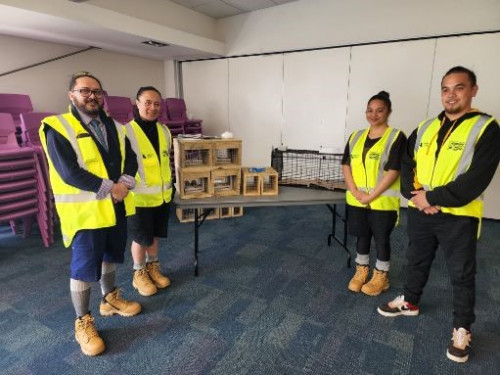Collaboration supports mahi to restore natural environment
7 November 2022
A collaboration between Te Ara Hīkoi Trust and Primary ITO is supporting a community goal to restore the natural environment across the North Waikato motu from coast to coast.
Te Ara Hīkoi Trust draws together and supports local community organisations in Franklin and North Waikato that are working towards enhancing biodiversity in the area through pest control programmes.

Te Ara Hīkoi means “The way, or the journey” and refers to the shared journey toward a flourishing environment and traditional walkways that connect the Franklin Rohe. Conservation and predator free groups, local iwi, and government organisations are among those that formed the Trust.
The vast 190,000 ha area involved stretches from the Awhitu Peninsula in the west, to the Firth of Thames in the east. It involves some of Auckland’s most important biodiversity including colonies of shorebirds and peninsula ecosystems, and the bushland of the Hunua Ranges, and Mataitai Forest.
Pests being targeted and trapped include possums, ferrets, hedgehogs, feral cats and rats, with large areas of the land in farms, horticulture or lifestyle blocks.
Funding supports training for rangatahi
Project lead Colin Pukeiti says the Trust’s role is to facilitate community-led predator control programmes. Alongside iwi groups and stakeholders of the Franklin Rohe, it has developed a strategy to strengthen restoration of the natural area, with the mahi centred around the values mahitahi, kaitaikitanga, and manaakitanga.
In 2022 Te Ara Hīkoi got a welcome boost with Jobs for Nature funding to employ more people in pest control work, resulting in a collaboration with Primary ITO to train rangatahi in the skills of pest control.
Learners study the New Zealand Certificate in Rural Pest Operations Level 3, which covers rural pest control and monitoring, while working on the job. They learn how to carry out pest control operations safely and use equipment and vehicles over the 10-month programme.
In late 2022 two supervisors, kaiwhakahaere, from local iwi and two advanced field agents began working on the programme, and a further six field agents will start in early 2023.
Programme boosts skills in environment sector
Colin says as well as building a trained team at Te Ara Hīkoi, the Primary ITO programme supports the Trust’s bigger goal to bring more skills and people to the environmental sector.
“There is a real need for more skilled people in this area and the longer-term plan is to bolster the available resource and open opportunities for our rangatahi to work and contribute.”
And Colin says the programme is a welcome opportunity for iwi. Many of the learners signing up had previous experience in restoration and were keen for an opportunity to learn and gain a qualification.
“I have shared our mahi and plans at several hui and there are people interested and ready to go. A lot of people have been waiting for an opportunity like this to happen.”
Primary ITO Primary Services Sector Manager Tanya Ingram says the Trust is a good example of an organisation looking after its people by enabling them to grow their knowledge, gain a nationally recognised qualification and achieve success.
Vast whenua to cover
While it seems like a huge area to cover for a developing group of pest controllers and community volunteers, they have some smart tools on their side.
The Trust plan and mahi grew out of strong community interest in predator control with groups holding regular “bait and trap” days to educate and train others. Armed with the Trap NZ App, volunteers have set hundreds of traps in recent years and now monitor them online.
The Trust has also developed a ground-breaking smart double-ended cage trap which is remotely monitored on a wireless network. It has an automatic lure and sensors that send an electronic alert to the network when the trap is triggered.
Award winning smart trap
The smart trap won the 2022 Auckland Mayor Conservation Award for innovation and is set to become a revenue stream for the Trust in future.
The smart technology means volunteers and pest control workers can monitor traps on their phones and receive alerts when a nearby trap is triggered, allowing for quick trap clearance and rebaiting. Colin says the system reduces the time and cost of checking traps across such a large area and is also engaging and motivating for volunteers.
The future is bright as the Trust looks to test the new technology further and explore other ways it might be used to eradicate pests.
It is also looking at offering more Primary ITO programmes to support its plan, including tikanga Māori.
Colin says the Trust is most thankful to have Awhitu Landcare providing a learning base and supporting kaimahi, and Whakaupoko Landcare who have also given their time and advice to kaimahi. “We also have the three iwi who have supported the development of our taonga, which is an important feature in our practice."
To learn more about Primary ITO pest management programmes, click here.
